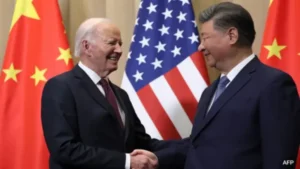
Brazil will be the second member of the BRICS after India not to endorse the BRI.
BEIJING: In a major blow to China’s BRI, Brazil has decided not to join Beijing’s multi-billion dollar initiative and has become the second country in the BRICS bloc after India to not support the mega project.
Brazil, led by President Lula da Silva, will not join the Belt and Road Initiative (BRI) and will instead seek alternative ways to cooperate with Chinese investors, Celso Amorim, the president’s special adviser for international affairs, said on Monday.
Speaking to Brazilian newspaper O Globo, he said Brazil wants to “take relations with China to a new level, without signing any accession contracts”.
“We are not making a treaty”, Amorim said, clarifying that Brazil does not want to treat Chinese infrastructure and trade projects as an “insurance policy”.
According to Amorim, the aim is to establish “synergies” between Brazilian infrastructure projects and investment funds linked to the initiative using the Belt and Road framework, without formally joining the group, the Hong Kong-based South China Morning Post quoted him as saying.
The Chinese “call it the Belt [and Road] … and they can give it whatever name they want, but what matters is that there are projects that Brazil has defined as priorities and that may or may not be accepted [by Beijing]”, Amorim said.
The decision runs contrary to China’s plan to include Brazil in the initiative, which will be a highlight of Chinese President Xi Jinping’s state visit to Brasilia on November 20, the Post reported.
It said officials from Brazil’s economy and foreign affairs ministries have recently opposed the idea.
The prevailing opinion in Brazil was that joining China’s flagship infrastructure project would not only bring Brazil no concrete benefits in the short term but could also complicate relations with a potential Trump administration.
Last week, Amorim and presidential chief of staff Rui Costa visited Beijing to discuss the initiative. According to sources, they returned “dissatisfied and underwhelmed” by China’s proposals, the Post reported. Lula did not attend the BRICS summit held in Kazan this month due to injury and his close ally and former Brazilian president Dilma Rousseff currently heads the Shanghai-based BRICS New Development Bank (NDB). BRICS originally comprised Brazil, Russia, India, China and South Africa. Egypt, Ethiopia, Iran, Saudi Arabia and the United Arab Emirates have been added as new members. Brazil will be the second BRICS member after India not to support the BRI. India was the first country to object and stood firmly in opposition to the BRI, which is a pet project of Chinese President Xi Jinping aimed at furthering China’s global influence with investments in building infrastructure projects. India has protested against China’s construction of the US$60 billion China-Pakistan Economic Corridor (CPEC), called the flagship project of the BRI, through Pakistan-occupied Kashmir (POK) which violates its sovereignty. India is also vocal about its criticism of BRI projects, stating that they should be based on universally recognised international norms, good governance and rule of law and follow principles of openness, transparency and financial stability. China then faced criticism that BRI projects in smaller countries like Sri Lanka, especially the acquisition of Hambantota for a 99-year lease in the form of a debt swap, became debt traps resulting in a deep financial crisis in both the smaller countries. Indian diplomats here point out that apart from staying away from the BRI’s three annual high-profile meetings in Beijing in the past few years, India has voiced its opposition to it at both BRICS and the Shanghai Cooperation Organisation (SCO). US Trade Representative Katherine Tai recently urged Brazil to look at its proposal to join the BRI from an “objective point of view” and “risk management” perspective.
The Chinese embassy in Brasilia described her remarks as “irresponsible” and “outrageous”. China’s state-run Global Times newspaper in an editorial on Monday described Tai’s comments against the BRI as shrouded in the ghost of the “Monroe Doctrine”. “Brazil does not need to dictate to others whom to cooperate with or what kind of partnership to enter into, and normal economic and trade cooperation between China and Latin American countries should not be subject to the scrutiny of third countries,” it said. “Currently, the US is attempting to build a “small yard, high fence” against China in Brazil and other Latin American countries”, it said. “Cooperation between China and Brazil is not only in line with the interests of the two countries, but also meets the Global South’s need to build a more just and equitable international economic order. This trend is something Washington cannot stop,” it said.

Continuing the achievement of the journey of effectiveness and credibility of more than 10 years in the career of journalism, as a woman journalist, I am Serving as the founder, promoter and editor of DiaryTimes with the trust and support of all. My credible coverage may not have given a big shape to the numbers, but my journey presents articles that make you aware of the exact and meaningful situations of Himachal’s politics, ground issues related to the public, business, tourism and the difficult geographical conditions of the state and financial awareness. DiaryTimes, full of the experience of my precise editorial expertise, is awakening the flame of credible journalism among all of you, so that the eternal flame of meaningful change can be lit in the life of the people of the state and the atrocities being committed against the people can be brought to the fore, I am motivated for that. If even a small change comes with the power of my journalism and the whole world becomes a witness to that issues, then I will consider myself fortunate.








